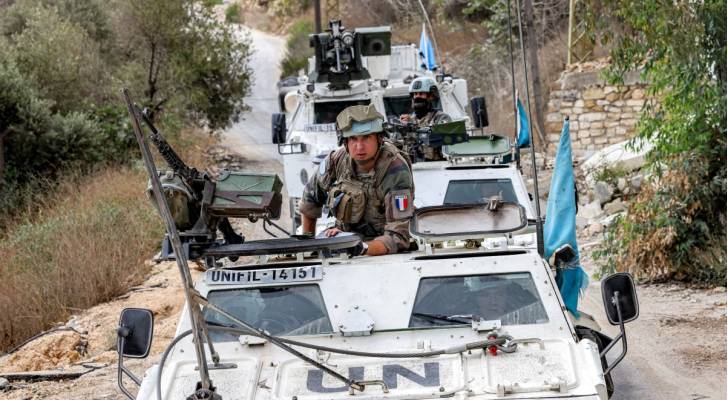Armored vehicles of the United Nations Interim Force in Lebanon (UNIFIL) (Credit: AFP)
UN votes to end Lebanon peacekeeping mission in 2027
The United Nations Security Council has agreed to phase out its long-running peacekeeping mission in Lebanon, setting a deadline of 2027 for the withdrawal of UN forces after nearly 50 years on the ground.
The vote, held Thursday, extends the mandate of the United Nations Interim Force in Lebanon (UNIFIL) for one final term until Dec. 31, 2026, followed by a year-long “orderly and safe drawdown and withdrawal.” The resolution passed unanimously after the United States signaled it would veto any proposal allowing further renewals.
- 'Israel' welcomes decision -
'Israel', which has lobbied for UNIFIL’s termination alongside Washington, quickly praised the move.
"For a change, we have some good news coming from the UN," 'Israel’s' ambassador Danny Danon said. "I want to remind you, 47 years ago, the Security Council decided to send the UNIFIL force to South Lebanon in order to stabilize the region. We all know they failed. Hezbollah took over the region. Today, the Lebanese government has the responsibility to take control of the area and to understand that they have to be there, not Hezbollah, not anyone else."
- France yields under pressure -
France, historically a strong supporter of Lebanon and its peacekeepers, had initially sought a routine one-year extension. But following US insistence on a clear exit date, Paris brokered a compromise that ended with Thursday’s vote.
The force of around 10,800 troops has operated along Lebanon’s southern frontier since 1978 and remained after 'Israel' ended its occupation of the area in 2000.
- US position -
US envoy Dorothy Shea said the time had come to draw the mission to a close. “UNIFIL was explicitly meant to be ‘interim,’” she noted, adding that Lebanon’s security landscape has shifted dramatically in the past year. “We urge the international community to use the coming year to bolster the Lebanese armed forces,” she said.
- Mixed response in Lebanon -
Lebanon had initially resisted the proposal. President Joseph Aoun warned just days earlier that scaling back the mission “will negatively impact the situation in the south, which still suffers from Israeli occupation.”
But after the resolution passed, Beirut moved to welcome the outcome, pointing to the value of securing one more extension. Aoun expressed hope “that the additional year for withdrawal will be a fixed deadline for confirming and strengthening Lebanon's sovereignty over its borders.”
- Concerns over Hezbollah’s role-
The timing of the withdrawal comes as Hezbollah reels from heavy 'Israeli' strikes that killed its leader and dismantled much of its infrastructure in southern Lebanon. Under the terms of a recent truce, the Lebanese army has begun deploying in the south and taking over positions once held by the group.
Still, not all Security Council members are convinced the mission should end. The UK’s ambassador James Kariuki said his government feared “a premature withdrawal of UNIFIL would risk fostering a security environment that Hezbollah can exploit. That would harm communities both on sides of the Blue Line and set back efforts for a long-term political agreement.”
China also criticized Washington’s approach, with envoy Geng Shuang saying, “Indeed no UN mission should exist permanently. But no mission should withdraw in haste while the situation remains tense.”
- A turning point after decades -
Established in 1978, UNIFIL was one of the UN’s longest-standing peacekeeping operations. Its end marks a significant change in the balance of security arrangements along the 'Israel'-Lebanon border, leaving responsibility squarely on the Lebanese Armed Forces once the withdrawal is completed in 2027.




